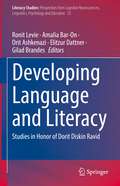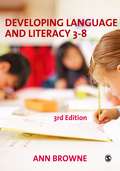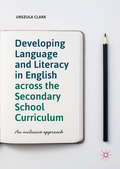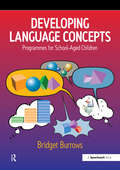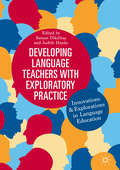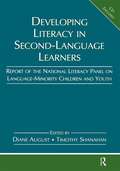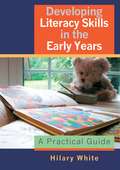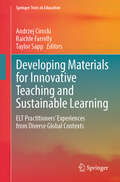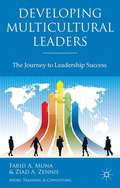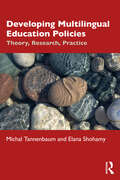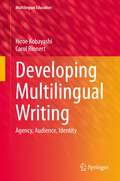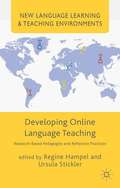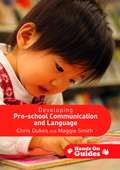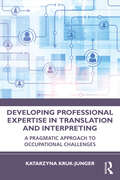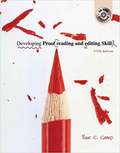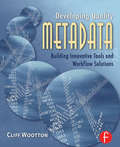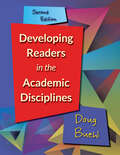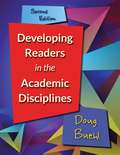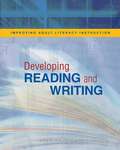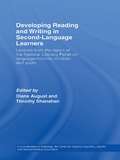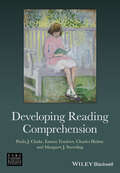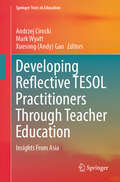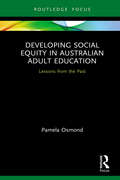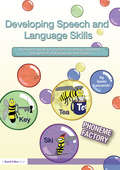- Table View
- List View
Developing Language and Literacy: Studies in Honor of Dorit Diskin Ravid (Literacy Studies #23)
by Ronit Levie Amalia Bar-On Orit Ashkenazi Elitzur Dattner Gilad BrandesThis volume dedicated to Dorit Ravid, offers 29 new chapters on the multiple facets of spoken and written language learning and usage from a group of illustrious scholars and scientists, focusing on typologically different languages and anchored in a variety of communicative settings. The book encompasses five interrelated yet distinct topics. One set of studies is in the field of developmental psycholinguistics, covering the acquisition of lexical and grammatical categories from toddlerhood to adolescence. A second topic involves a section of studies on the interface of cognition and language, with chapters on processing, production, comprehension, teaching and learning language in usage and in historical perspective. A third topic involves a theoretical and applied perspectives on the acquisition and development of literacy competence, including reading, writing, spelling and text production. A fourth topic brings together an array of studies on social, environmental and clinical diversity in language, highlighting novel issues in multilingualism, immigration, language and literacy disorders. Finally, a section of the volume examines in depth questions in Modern Hebrew linguistics, as the home language and launching base of Dorit Ravid’s research work.
Developing Language and Literacy 3-8 (One-off Ser.)
by Ann BrowneA new edition of this book is available `This is a handsome Second Edition of a book that has remained an invaluable and comprehensive guide for practising and trainee teachers since its publication in 1996. . . . I hope that all practitioners who love children, language and literature will add this book to their collections of well-used professional books' - Nursery World `This is a practical book and it will be very useful for teachers and Early Years practitioners seeking to review and update their practices in literacy teaching and learning. It will be especially useful to practitioners in England and Wales who have to implement The National Literacy Strategy and the Curriculum Guidance for the Foundation Stage' - Penny Munn, International Journal of Early Years Education Developing Language and Literacy 3 - 8: Second Edition is a comprehensive and practical introduction to teaching and learning English in the early years. The new edition has been fully updated to take account of the new requirements for teaching English in the early years including, the Curriculum Guidance for the Foundation Stage, English in The National Curriculum and The National Literacy Strategy. It covers all aspects of language and literacy and draws on current thinking, research and classroom expertise in order to describe practice that is rooted in research. The book includes chapters on: - Speaking and Listening - Reading - Resources for Language and Literacy - Writing - Spelling, Handwriting and Punctuation - Bilingual Learners - Language, Literacy and Gender - Children with Difficulties - Involving Parents and Carers -Assessment - Planning Further reading and sources of information, including Websites, are given so that readers can explore aspects of English in more depth. It also includes a section on the role of the English post- holder. The book covers the English elements of the Curriculum for Initial Teacher Training, particularly those relating to pedagogical knowledge and teaching and assessment methods, and so should be of particular use and interest to trainee teachers following 3 - 8, 5 - 8 or 5 -11 courses.
Developing Language and Literacy in English across the Secondary School Curriculum: An Inclusive Approach
by Urszula ClarkThis book draws on original research and a language based pedagogy approach to examine how secondary schools in the UK can devise and implement coherent language and literacy across curriculum policies and strategies, so that grammar and associated metalanguage becomes an integral part of their day to day curriculum practices. The research was undertaken in three 11 to 18 secondary schools in England, where the majority of students are categorised as having English as a second language (EAL), and where a significant minority are also socially disadvantaged in two of the three. The author argues that paying explicit attention to the linguistic structures through which subject knowledge is realised can be of benefit to all pupils in ways that are also socially just and democratic. This book provides an important bridge between academic theory and educational practice that will appeal to applied linguists and sociolinguists, as well as to teachers, teacher trainers and practitioners.
Developing Language Concepts: Programmes for School-Aged Children
by Bridget BurrowsThis book is a valuable resource for all speech language therapists, teachers and support assistants working with children in schools and community clinics. It provides practical, step-by-step photocopiable programmes to help with specific language concepts, such as amount, colour, size, time and shape. The programmes are intended for speech language therapists to copy and send to the school where staff can deliver the programmes, although they can be used by the therapist themselves. Clearly set out, the exercises can be personalised for each child and are graded so that the therapist can select and copy the sheets relevant to the child's needs. Each programme introduces the concept, teaches it and then checks to see if the child understands it. There is also practical advice on setting up therapy programmes in schools, such as setting up appointments, working in the school with children, staff and parents, covering letters to send with the programme, how to write programmes and many other useful tips.
Developing Language Teachers with Exploratory Practice: Innovations and Explorations in Language Education
by Kenan Dikilitaş Judith HanksThis edited collection explores the use of Exploratory Practice (EP) by language teachers in classrooms. Written by practitioners, the chapters showcase unique examples of each principle of EP, with topics ranging from mentoring practitioner researchers, to teaching and learning in EAP, and investigating curriculum development in language teaching programs. The book provides example EP studies and gives voice to practitioners’ experiences of the challenges they experienced as well as the benefits. Examples include tackling intercultural communication in linguistically and culturally diverse classrooms; pedagogy and curriculum design in language teaching; explorations of continuing professional development in language education. In doing so, it offers tools that can be transferred to other classroom contexts and used to aid teacher development. The concluding chapter highlights critical aspects of Exploratory Practice which emerge in the studies and examines how practitioners advanced their understandings. This book will appeal to those working in Applied Linguistics, TESOL research, as well as language teachers and teacher educators.
Developing Literacy in Second-Language Learners: Report of the National Literacy Panel on Language-Minority Children and Youth
by Diane August Timothy ShanahanThis volume reports the findings of the National Literacy Panel on Language-Minority Children and Youth. The formal charge to the panel—a distinguished group of expert researchers in reading, language, bilingualism, research methods, and education—was to identify, assess, and synthesize research on the education of language-minority children and youth with respect to their attainment of literacy. Funding for the project was provided to the Center for Applied Linguistics and SRI International by the U.S. Department of Education’s Institute of Education Sciences and the Office of English Language Acquisition, with additional funding from the National Institute of Child Health and Human Development provided through the U.S. Department of Education. The authors review the state of knowledge on the development of literacy in language-minority children and youth, organized around five specific themes:*Development of Literacy in Second-Language Learners;*Cross-linguistic Relationships in Second-Language Learners;*Sociocultural Contexts and Literacy Development*Educating Language-Minority Students: Instruction and Professional Development; and*Student Assessment Each part begins with a synthesis chapter that spells out the research questions for the chapters in that part, provides background information, describes the methodology used, summarizes the empirical findings reported, addresses methodological issues, and makes recommendations for future research. The following chapters provide more detail on the individual studies reviewed for specific research questions. The volume includes two opening chapters, “Introduction and Methodology” and “Demographic Overview”; a closing chapter that summarizes the report, identifies cross-cutting themes, and makes recommendations for future research; and a CD-ROM providing a searchable database of research references. The audiences for this volume include researchers interested in the development of literacy in language-minority children and youth as well as those studying literacy more generally, and those concerned with improving the education of this population of students.
Developing Literacy Skills in the Early Years: A Practical Guide
by Hilary White'I found this book to be very useful and would recommend it to all infant teachers, especially those working with children with special needs. . . It gave me plenty of new ideas, and would be especially helpful to newly trained teachers' - REACH Many young children need targeted support and encouragement to help develop their literacy skills. This book contains tried and tested activities to improve listening, verbal reasoning and language skills in young children and shows you how to turn theory into fun, practical ideas for the classroom. The author shows how to link activities to the Early Learning Goals and the National Literacy Strategy and the book includes: - lesson activities using puppets, nursery rhymes, story boxes and picture books; - suggestions for using role-play; - ideas for organising your play setting to encourage literacy-related play; - lesson plans; - assessment guidelines; - lists of resources; - a selection of photocopiable material. This book is a valuable resource for those working with children aged 3 to 8 and those working in playgroups, day nurseries, nursery schools and reception classes will find it particularly useful. It suggests ways to improve young children's literacy skills and can also be used as an INSET resource to share with the whole staff. Hilary White is a freelance writer, consultant and teacher. She lectured for many years in an early years training college.
Developing Materials for Innovative Teaching and Sustainable Learning: ELT Practitioners’ Experiences from Diverse Global Contexts (Springer Texts in Education)
by Andrzej Cirocki Raichle Farrelly Taylor SappThis volume features current, innovative, and effective ways of developing instructional materials for diverse English Language Teaching (ELT) contexts. It is divided into four sections, each featuring pedagogical materials designed for specific groups of learners. The sections focus on materials for general English, ESP and EAP, CLIL, and ELT teacher education courses. The chapters, written by experienced educators from around the world, are highly practical and detail the process of designing materials for innovative and sustainable language education. The contributors reflect on their own practice, describe the materials design process, explain the guiding principles, and connect the design process with the local context and educational policies. They also offer practical tips to inspire classroom practitioners to create their own materials, promoting innovative teaching and sustainable learning. Ultimately, their chapters aim to encourage a world where teaching involves creativity and adaptability, leading to transformative learning for both teachers and learners.
Developing Multicultural Leaders
by Farid A. Muna Ziad A. ZennieThe authors identify three stages of leadership development - the early ingredients for success starting from childhood, the paths that current and aspiring leaders should follow once they start a career, and what leaders should do exceptionally well to become and remain outstanding in organizations operating in multicultural environments.
Developing Multicultural Leaders
by Farid A. Muna Ziad A. ZennieThe authors identify three stages of leadership development: the early ingredients for success starting from childhood; the paths that current and aspiring leaders should follow once they start a career; and what leaders should do exceptionally well to become and remain outstanding in organizations operating in multicultural environments.
Developing Multilingual Education Policies: Theory, Research, Practice
by Elana Shohamy Michal TannenbaumMultilingual policies are increasingly important and required in educational settings worldwide, yet a solid experimental body of theory, research, and practice providing guidance for the development of policies is lacking. The Israeli context presented in this book serves as a case study or a model that could be used by bodies or entities seeking to devise a multilingual policy. The authors begin by addressing the general notion of a multilingual education policy with specific reference to the Israeli context. The book then focuses on specific challenges confronting the new policy that have been explored in empirical studies, and concludes with a proposed framework for a new multilingual education policy related to the core theoretical topics and empirical findings discussed in the previous chapters. This framework includes principles and strategies for implementing the process described in the book in other contexts, ensuring wide applicability and relevance. Developing Multilingual Education Policies: Theory, Research, Practice is an essential read for all involved in language policy and planning within applied linguistics and education.
Developing Multilingual Writing: Agency, Audience, Identity (Multilingual Education #42)
by Hiroe Kobayashi Carol RinnertWith millions of people becoming multilingual writers in the globalized digital world, this book helps to empower writers to connect with their readers and project their identities effectively across languages, social contexts, and genres. In a series of closely-related studies that build on each other, we look comprehensively at how writers develop their ability to construct meaning for different audiences in multiple languages. This book, which draws on various approaches (including a social view of writing, multicompetence, adaptive transfer, complex systems theory, motivation, and translanguaging), contributes to on-going efforts to integrate differing approaches to multilingual writing research. This book focusses on how writer agency (control over text construction), audience awareness (ability to meet expectations of prospective readers), and writer identity (projection of image of the writer in the text) progress as multilingual writers gain more experience across languages. The within-writer, cross-sectional text analysis (Chapters 2-5) examines 185 essays written in Japanese and English by eight groups of writers from novice to advanced (N=103), supplemented by insights from these writers’ reflections. We explore how they employ three kinds of text features (discourse types, metadiscourse, and self-representation), which relate to their developing agency, audience, and writer identity in their text construction, and propose a new model for writer voice construction based on those features. The four case studies (Chapters 6-9) focus on five university students and six professionals to examine closely how individual writers’ agency, audience, and identity are interrelated in their text construction in two or three languages and diverse genres, including academic and creative writing. The combined studies provide new insights into multilingual writing development by revealing the close interrelationship among these three principal aspects of writing across languages. They also demonstrate the writers’ multi-directional use of dynamic transfer (reuse and reshaping) for L1, L2, and L3 text construction, and the use of mixed languages L1/L2 or L1/L3 (translanguaging) for composing processes, in addition to the creative power of multilingual writers.One significant contribution of this book is to provide models of innovative ways to analyze text and new directions for writing research that go beyond complexity, accuracy, and fluency. Categories and detailed examples of text features used for writer voice construction (e.g., specific characteristics of Personal, Emergent, and Mature Voice) are helpful for writing teachers and for developing writers to improve ways of conveying their own intended writer identity to the reader. The studies break new ground by extending our analysis of L2 writing to the same writers’ L1 and L3 writing and multiple genres.
Developing Online Language Teaching
by Regine HampelWhen moving towards teaching online, teachers are confronted every day with issues such as online moderation, establishing social presence online, transitioning learners to online environments, giving feedback online. This book supports language teaching professionals and researchers who are keen to engage in online teaching and learning.
Developing Pre-School Communication and Language (Hands on Guides)
by Maggie Smith Chris DukesIncludes CD-Rom `This book is highly recommended for all practitioners interested in improving their practice in developing young children's communication and language. The ability to print material form the CD-Rom enables the information to be accessed by practitioners working with children of different ages in different rooms in a setting' - Early Years Update `A very clear and easy to read style of text. . . This book has a common sense approach to good practice. I thoroughly recommend this book to anyone wishing to develop this area of childminding work' - National Childminding Association `An excellent resource for all those working with young children. . . the ideas are tried and tested, user-friendly and research-based, and can be trusted and implemented with ease' - Early Years Educator `This book will be an invaluable support: a treasure-chest of superb resources, materials, ideas and suggestions for the busy early years practitioner who is keen to develop the language of the children in their care. The CD-ROM will save some of that precious time we all strive to expand, and the practical strategies offered will be a boon to practice in the setting' - Collette Drifte Looking for advice on how to develop communication and language skills in the pre-school? Packed with helpful advice on supporting and developing the crucial language and communication skills of the children in your early years setting, this book provides clear guidance on appropriate expectations for each age group between birth to five. The book includes: - advice on how to support language development in all children, including those with special educational needs - practical ideas and strategies for practitioners and parents - guidance on when to seek advice and working with other professionals - activities and case studies - a CD Rom with useful photocopiable resources. This book is ideal for all those working with the 0 to 5 age range, such as pre-school practitioners, nursery managers, advisory teachers, SENCOs, Inclusion Officers and Child Care and Education students and tutors. Chris Dukes and Maggie Smith are both Area SENCOs who work closely with pre-school SENCOs and Managers on a daily basis.
Developing Professional Expertise in Translation and Interpreting: A Pragmatic Approach to Occupational Challenges
by Katarzyna Kruk-JungerDeveloping Professional Expertise in Translation and Interpreting covers what professional expertise means for translators and interpreters in the fast-changing, globalised world and how it can be achieved in practice.The book offers tactics and solutions for everyday issues, such as competence, etiquette, cultural differences, the translator’s role in communication, dealing with mistakes and using new technologies, using real-life examples of the occupational challenges practitioners face in their line of work. These range from translating Donald Trump’s controversial political tweets or interpreting during Oscar Pistorius’ high-profile court trial.This user-friendly guide helps students in translator training, or professionals starting out as translators and interpreters, establish good working standards and offers pragmatic solutions to common professional dilemmas for more experienced translators and interpreters.This is also an ideal resource for professors creating curricula in the area of ethics and etiquette within translation and interpreting, offering an interdisciplinary approach and an overview of the literature regarding all key topics.
Developing Proofreading And Editing Skills
by Sue C. CampDeveloping Proofreading and Editing Skills, 5/e by Camp provides instruction and applications designed to sharpen skills in detecting and correcting errors in written communications including memos, letters, reports, email messages, databases, presentation slides, advertisements, and spreadsheets. The material progresses from easy-to-recognize errors to those more difficult to spot, allowing students to build confidence and skill. Highlights of the 5th edition include a discussion of voice-recognition technology and proofreading and editing, end-of-chapter text applications with two applications in each chapter available on CD-ROM, and a series of seven review modules offering challenging proofreading practice.
Developing Quality Metadata: Building Innovative Tools and Workflow Solutions
by Cliff WoottonWith the explosion of new audio and video content on the Web, it's more important than ever to use accurate and comprehensive metadata to get the most out of that content. Developing Quality Metadata is an advanced user guide that will help you improve your metadata by making it accurate and coherent with your own solutions. This book is designed to get you thinking about solving problems in a proactive and productive way by including practical descriptions of powerful programming tools and user techniques using several programming languages. For example, you can use shell scripting as part of the graphic arts and media production process, or you can use a popular spreadsheet application to drive your workflow. The concepts explored in this book are framed within the context of a multimedia professional working on the Web or in broadcasting, but they are relevant to anyone responsible for a growing library of content, be it audio-visual, text, or financial.
Developing Readers in the Academic Disciplines
by Doug BuehlBeing literate in an academic discipline is more than being able to read and comprehend text; you can think, speak, and write as a historian, scientist, mathematician, or artist. Author Doug Buehl strips away the one-size-fits-all approach to content area literacy and presents an instructional model for disciplinary literacy, which honors the discipline and helps students learn within that area. In this revised second edition, Developing Readers in the Academic Disciplines shows how to help students adjust their thinking to comprehend a range of complex texts that fall outside their reading comfort zones. Inside you'll find: Instructional tools that adapt generic literacy practices to discipline-specific variationsStrategies for frontloading instruction to activate and build background knowledgeNew approaches for encouraging inquiry around disciplinary textsIn-depth exploration of the role of argumentation in informational textNumerous examples from science, mathematics, history and social studies, English/language arts, and related arts to show you what vibrant learning looks like in various classroom settings Designed to be a natural companion to Buehl's Classroom Strategies for Interactive Learning, Developing Readers in the Academic Disciplines introduces teachers from all disciplines to new kinds of thinking and, ultimately, teaching that helps students achieve new levels of understanding.
Developing Readers in the Academic Disciplines (2nd Edition)
by Doug Buehl<p>Being literate in an academic discipline means more than simply being able to read and comprehend text; it means you can think, speak, and write as a historian, scientist, mathematician, or artist. Doug Buehl strips away the one-size-fits-all approach to content area literacy and presents a much-needed instructional model for disciplinary literacy, showing how to mentor middle and high school learners to become "academic insiders" who are college and career ready. <p>This thoroughly revised second edition of Developing Readers in the Academic Disciplines shows how to help students adjust their thinking to comprehend a range of complex texts that fall outside their reading comfort zones. This book --a natural companion to Buehl's Classroom Strategies for Interactive Learning, which has been bolstering student comprehension for almost three decades--provides the following supports for teachers: <p> <li>Instructional tools that adapt generic literacy practices to discipline-specific variations <li>Strategies for frontloading instruction to activate and build background knowledge <li>New approaches for encouraging inquiry around disciplinary texts <li>In-depth exploration of the role of argumentation in informational text <li>Numerous examples from science, mathematics, history and social studies, English/language arts, and related arts to show you what vibrant learning looks like in various classroom settings</li> <p> <p>Developing Readers in the Academic Disciplines introduces teachers from all disciplines to new kinds of thinking and, ultimately, teaching that helps students achieve new levels of understanding.
Developing Reading and Writing
by M. ChiangMore than an estimated 90 million adults in the United States lack the literacy skills needed for fully productive and secure lives. The effects of this shortfall are many: Adults with low literacy have lower rates of participation in the labor force and lower earnings when they do have jobs, for example. They are less able to understand and use health information. And they are less likely to read to their children, which may slow their children's own literacy development. At the request of the U. S. Department of Education, the National Research Council convened a committee of experts from many disciplines to synthesize research on literacy and learning in order to improve instruction for those served in adult education in the U. S. The committee's report, Improving Adult Literacy Instruction: Options for Practice and Research, recommends a program of research and innovation to gain a better understanding of adult literacy learners, improve instruction, and create the supports adults need for learning and achievement. Improving Adult Literacy Instruction: Developing Reading and Writing, which is based on the report, presents an overview of what is known about how literacy develops the component skills of reading and writing, and the practices that are effective for developing them. It also describes principles of reading and writing instruction that can guide those who design and administer programs or courses to improve adult literacy skills. Although this is not intended as a "how to" manual for instructors, teachers may also find the information presented here to be helpful as they plan and deliver instruction.
Developing Reading and Writing in Second-Language Learners: Lessons from the Report of the National Literacy Panel on Language-Minority Children and Youth. Published by Routledge for the American Association of Colleges for Teacher Education
by Diane August Timothy ShanahanA Co-Publication of Routledge, the Center for Applied Linguistics, and the International Reading Association This book is a shorter version of Developing Literacy in Second-Language Learners, reporting the findings of the National Literacy Panel on Language-Minority Children and Youth. This book concisely summarizes what is known from empirical research about the development of literacy in language-minority children and youth, including development, environment, instruction, and assessment. This more accessible version of the full report is intended for teachers, administrators, and researchers and for use in a wide range of teacher preparation courses and in inservice/ staff development programs that deal with educating English language learners. Visit www.reading.org for more information about IRA books, membership, and other services. Visit www.cal.org to learn more about the Center for Applied Linguistics.
Developing Reading Comprehension
by Paula J. Clarke Emma Truelove Charles Hulme Margaret J. SnowlingPresents cutting-edge, evidence-based interventions for dealing with specific difficulties of reading comprehension in children aged 7-11. An in-depth introduction to the ‘poor comprehender profile’, which describes children who despite being fluent readers have difficulty extracting meaning from text. Sets out a range of practical interventions for improving reading skills in this group - along with comprehensive guidance on assessment and monitoring, and insightful accounts of professionals’ experience in delivering the techniques described. Includes an overview of psychological theories of reading comprehension, evaluating their practical applicability.
Developing Reflective TESOL Practitioners Through Teacher Education: Insights From Asia (Springer Texts in Education)
by Xuesong Andy Gao Andrzej Cirocki Mark WyattThis textbook provides insights from Asian contexts into how reflective practice is nurtured on Teaching English to Speakers of Other Languages (TESOL) and English Language Teaching (ELT) teacher education programmes. There is increasing recognition worldwide that, given the centrality of reflective practice to teachers’ ongoing professional development, supporting teachers to become reflective practitioners should be integral to teacher education programmes. Consequently, tertiary-level courses in areas such as TESOL and ELT tend to promote reflective practice, supported by theoretical input from the burgeoning literature on reflection, much of which is produced in the West. Relatively under-represented in the literature are global perspectives on reflective practice; there are consequently relatively few accounts as to how reflective practice is embedded in teacher education programmes in different parts of the world, including Asia. Hence, this book addresses a gap. Contributing authors from fourteen countries provide insights into the ways in which teachers are helped to grow as reflective practitioners on their teacher education programmes in their unique contexts. This textbook showcases how reflective teaching practices are developed, supported by frameworks for critical reflection and in interaction with local educational policies. These distinctive accounts aid readers in reflecting on the ways in which reflective practice is supported in their own teacher education contexts and in considering ways of enhancing the reflective dimension of their programmes. This textbook showcases innovative reflective activities and can be used as a principal text or as supplemental reading on a range of TESOL and ELT teacher education courses.
Developing Social Equity in Australian Adult Education: Lessons from the Past
by Pamela OsmondDeveloping Social Equity in Australian Adult Education: Lessons from the Past presents a case study of the trajectory of an Australian adult basic education program in New South Wales from its humanist, social justice beginnings, through forty years of destabilising change. It identifies the influences and influencers that have directed this change; those that were responsible for the creation of the field in its foundation years, and that were displaced by other, more powerful actors representing the global influence of the neoliberal ideology. The story is told largely through archival evidence and the voices of those practitioners who helped shape the discourse and practice of the foundation years, and who were required to respond to constantly changing policies and socio-economic contexts. It discusses some lessons that might be learnt from the past in order that a new set of actors might be mobilised to promote an alternate discourse. This book will appeal to students and scholars of social justice and adult education, and practitioners involved in adult education.
Developing Speech and Language Skills: Phoneme Factory
by Gwen LancasterThis book is part of the Phoneme Factory Project undertaken by Granada Learning in partnership with the Speech and Language Therapy Research Unit (SLTRU) in Bristol. It aims to provide guidance for teachers, SENCos, SLTs and parents regarding: criteria for referral to speech and language therapy phonological disorders appropriate intervention approaches that can be used in the classroom and at home. Complementing the book is a CD containing downloadable resources including a picture library for the classroom and the home, as well as checklists and other time-saving documents.
